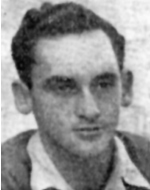Kalmanovitz, Gutman (Ziki, Shuka)
Son of Paulina and Ephraim, was born on September 10, 1928, in the city of Targu-Niametz, Romania, to a Hasidic family. His mother died by giving birth to him and his twin brother Dov. When he was five years old, he longed for the Land of Israel and “Irgun” – a group of “Chalutzim” – young children like him – and under his influence the children left their parents’ homes and immigrated to Israel. A riot broke out in the town and the children were taken back from the bus to their homes. Gutman attended high school and completed four classes. With the leadership of the Nazi regime in Romania was forced to stop his studies. At the end of World War II he joined the Zionist movement and was active in it. He immigrated to Israel on the illegal immigrant ship “Kibbutz Galuyot” (“Pan York”). The ship’s passengers were transferred to Cyprus and arrested there. He received from one of the members the “Aliyah” route – he “bought” it at the price of all his possessions, so that he would be early in the country. When he arrived in Israel, he joined the Irgun underground and in his spare time worked as a photographer, and in April 1948 he joined the army and served in the Alexandroni Brigade, where he practiced at Ein Shemer. He was a cheerful man and his smile was always on his face. Guttman took part in many operations on the front of the center and later on the southern front in the vicinity of Faluja During Operation Horev, a “liquidation” operation was carried out against the “Faluja pocket,” in which an Egyptian brigade was besieged. The eastern flank of the “pocket” in the area of Iraq al-Manshiyya, the Alexandroni forces broke into the village from the south and took over part of it, but their assault on the hill north of the village was repulsed. Some of the force was captured in the village, and on this day, on December 28, 1948, he was buried in Faluja, and afterwards he was transferred to an eternal rest in the cemetery Military presence in Nahalat Yitzhak.
